Time played: 18 hours
Platform: PC
In a corridor near the Gryffindor common room, there is a suit of armor that hums to itself. Forgetting that it’s supposed to be stoically standing guard, it lets out a vibrating trill that can be heard by the robed students going by, rushing between classes. Its neighbor, another suit of armor, urges it to shut up by punching it on the arm.
My first hours in Hogwarts Legacy, the open-world Harry Potter RPG, are filled with moments of discovery. Where, like with the suits of armor, I stop in my tracks to watch what is going on around me.
I find a set of portraits of musicians playing melodies to one another, with a student sitting on a bench listening to the impromptu band practice. A gargoyle built into the foot of a grand staircase busied by throngs of loud students, complaining, “A hundred and forty-two staircases, and this is where they put me”. Or, Peeves the Poltergeist flying out from a closed door to surprise a child carrying a stack of heavy books.
Strangely, the school is both new and familiar to me; a place I’ve never explored before but one that I’ve known for years from reading and re-reading the Harry Potter books when I was younger.
Hogwarts Legacy price and release date
- What is it? A third-person open-world RPG set in the Harry Potter universe
- Release date? February 10, 2023
- What can I play it on? PlayStation 5, Xbox Series X|S, PC
- Price? $69.99 / £64.99 / $AU79.99
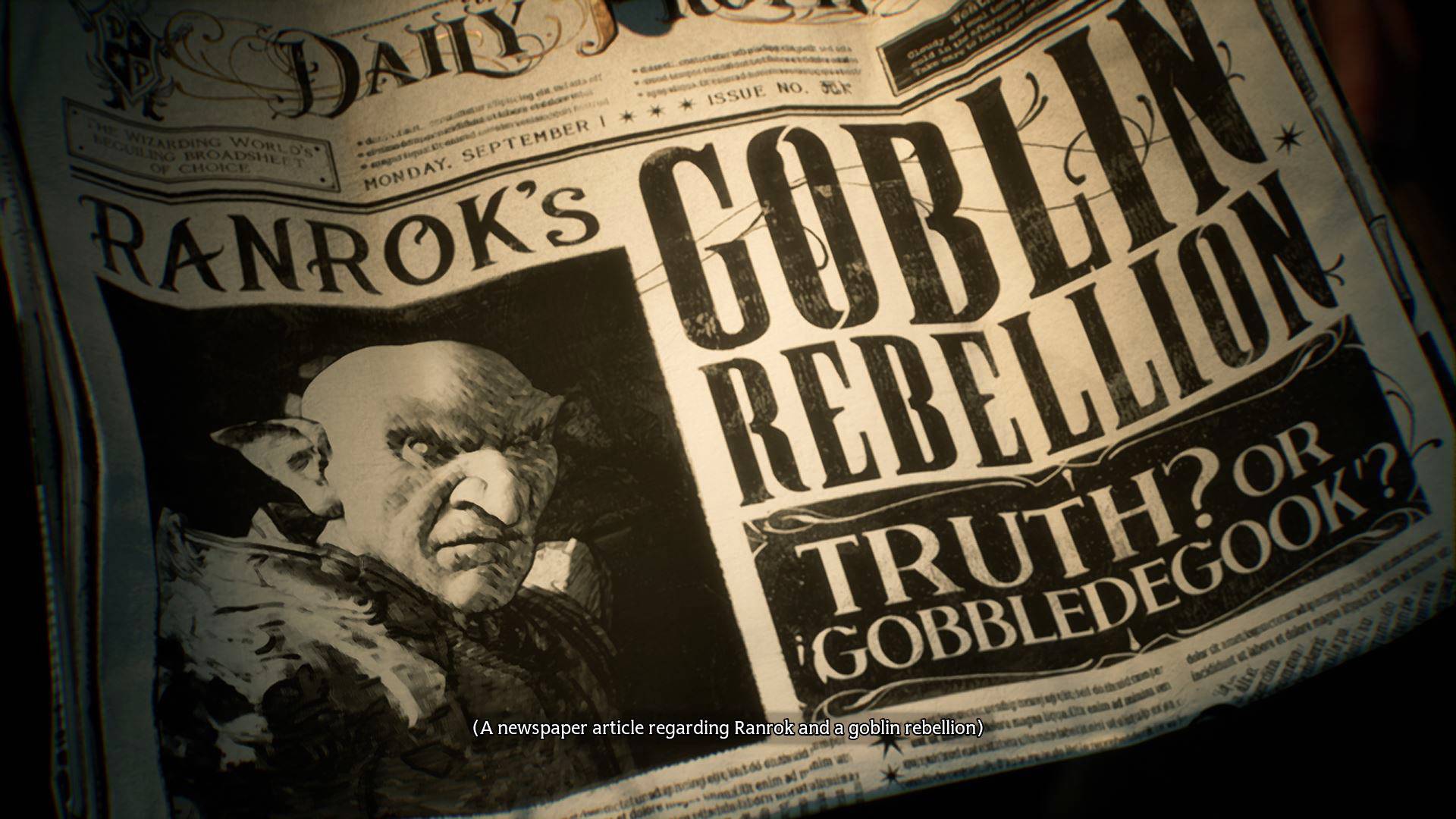
Unusual beginnings
There are important differences between Hogwarts Legacy and the books. For a start, you don’t play Harry Potter or any other characters you may know from the series. Set in the 1800s, centuries before the novels, most of the cast is not yet born. There are some familiar faces in the forms of Hogwarts’ ghost population, such as Gryffindor’s house ghost, Nearly Headless Nick, but for the most part, you can consider this to be an entirely different set of heroes and villains; they’re just inhabiting the same locations.
Another key difference between Harry Potter and Hogwarts Legacy is that you don’t start at the school with the other students; you are a late arrival, entering as a fifth year. Something your mentor, Professor Fig, tells you in the introduction is practically unheard of. But, he soon sees why you may have had this rare dispensation to join the school.
This is an entirely different set of heroes and villains; they’re just inhabiting the same locations you're familiar with
On your journey to the school, you are joined by a friend of Fig’s, a member of the Ministry of Magic. You overhear the two talking about a goblin called Ranrok, amassing an army of loyalists and harassing witches and wizards all over Britain. The friend pulls out a package he received from someone who Ranrok was hunting. To the two older men, it looks like an ordinary cylinder, but you can see a strange glow upon it. This is the first hint as to what makes you special; you can see and interact with this magic that other wizards can’t even perceive.
Hogwarts Legacy’s story sees you exploring this ancient magic and why Ranrok is so intent on harnessing it for himself.
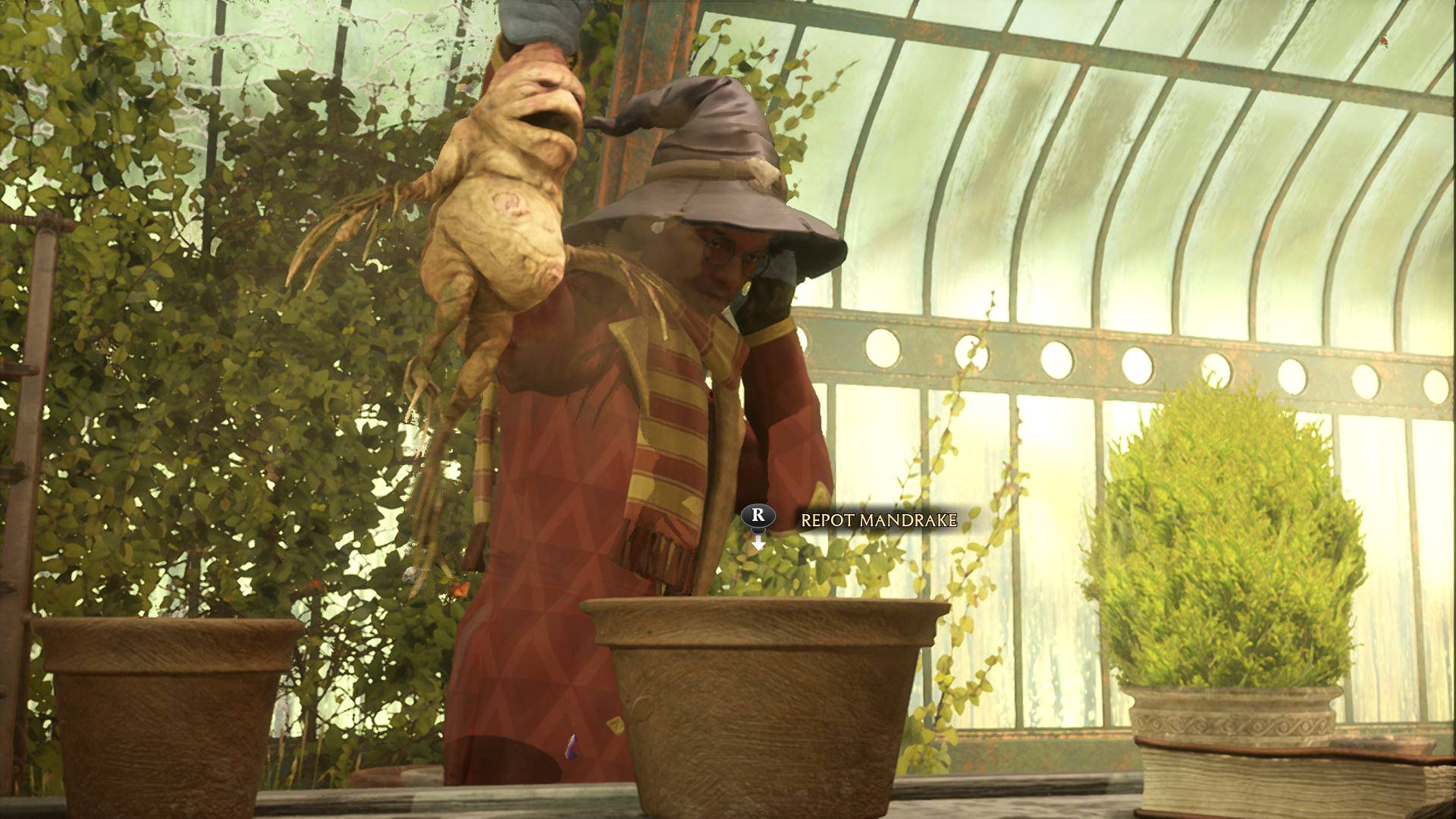
School days
After a detour involving a dragon, a portkey, and a set of puzzles in the depths of Gringotts bank, you arrive at Hogwarts just in time to take part in the Sorting Hat ceremony. Answering questions from the headwear, you’re placed in a house that fits your sensibilities. (Because I’m a goodie-two-shoes, I ended up in Gryffindor, although my head wanted to land in Ravenclaw.)
At this point, Hogwarts Legacy begins to open up. Deputy headmistress Weasley gives you a journal called the Wizard’s Field Guide, which tracks your quests and contains a map of the school, Hogsmeade, the wider world, and all the challenges and collectibles you can cross off. Your lessons in Potions, Defence Against the Dark Arts, and Herbology appear as missions to complete, a scripted set-piece that rewards you with a new spell to use around the world.
Pages fly around the vaulted ceilings of the school like trapped pigeons
The only way to collect experience points in Hogwarts Legacy is to complete quests and challenges logged in your Field Guide. And there are lots of them to take on. Hogwarts and the world around it are full of pages to discover. Some of them are ghostly outlines that you’ll spot in front of statues and landmarks, and casting Revelio nearby will manifest them into the world for you to collect. Others pages fly around the vaulted ceilings of the school like pigeons, and you can summon them to your hand by casting Accio.
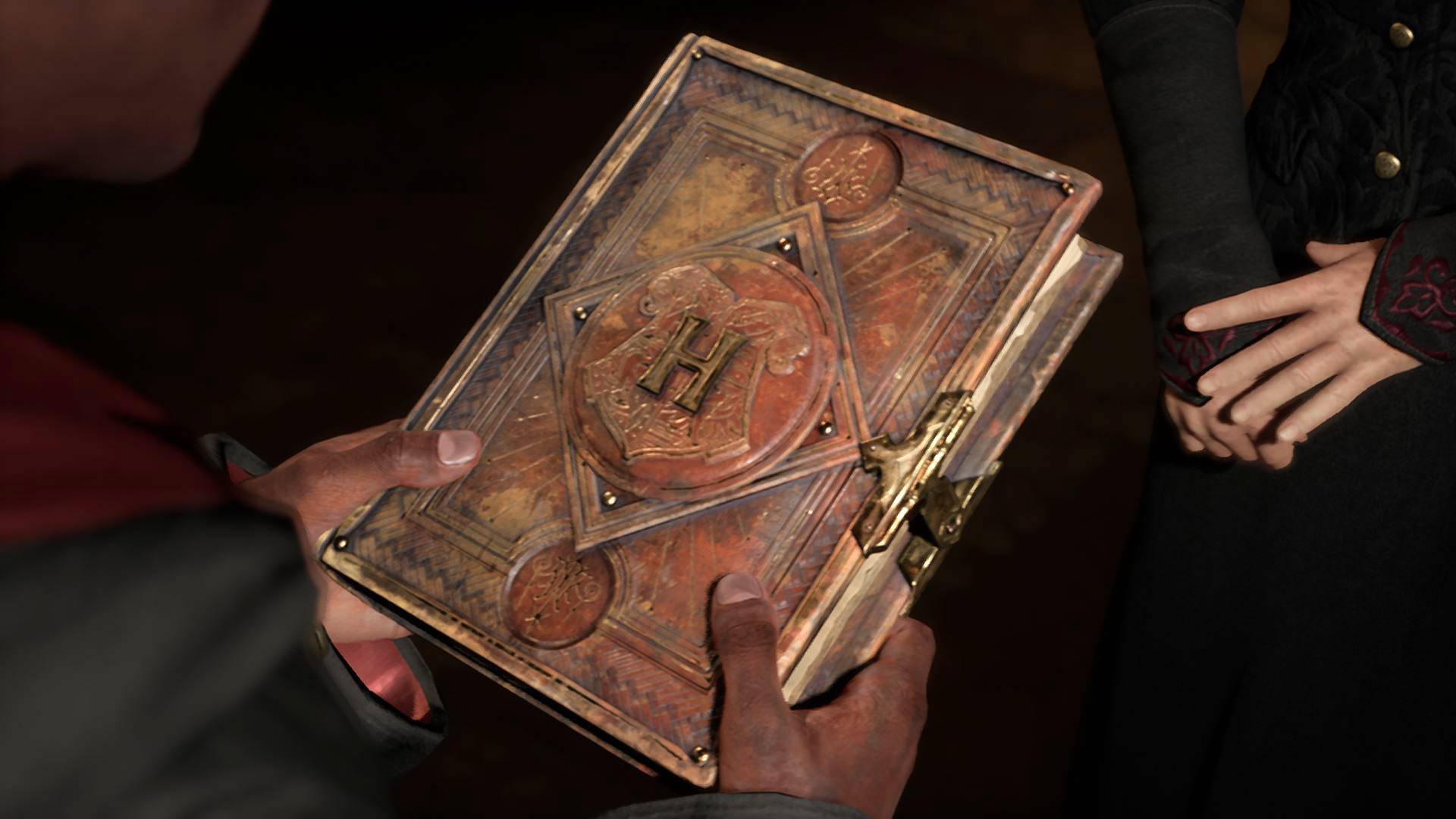
I lost myself in those first hours of Hogwarts Legacy, submerged in the story of Rankrok’s growing rebellion, wandering the corridors of Hogwarts looking for Field Guide pages, helping out students with puzzles, and taking in the charming details added by designers. But then I pass the suits of armor in the corridor near the Gryffindor common room. Again, one of them is humming, and the other, tired of its colleague’s noise, punches it on the arm. I see Peeves surprise a student again. The Gargoyle complains about its placement again.
It has the appearance of life but becomes stale once it turns into repetition
Then I realize I’m looping, too. I’m going through the halls in circles, casting Revelio every few seconds, trying to spot the telltale glint of a hidden Field Guide page. I heard the same conversations around me, the same music playing, and the same interactions between the ghosts, the portraits, and the students. It has the appearance of life but becomes stale once it turns into repetition.
Many open-world games struggle with repetition in their environments. Built to make a great first impression, they don’t often reward revisiting. But then, when you’re in a world filled with collectibles and missions that push you to retread your steps, all you’re going to do is spot the loops.
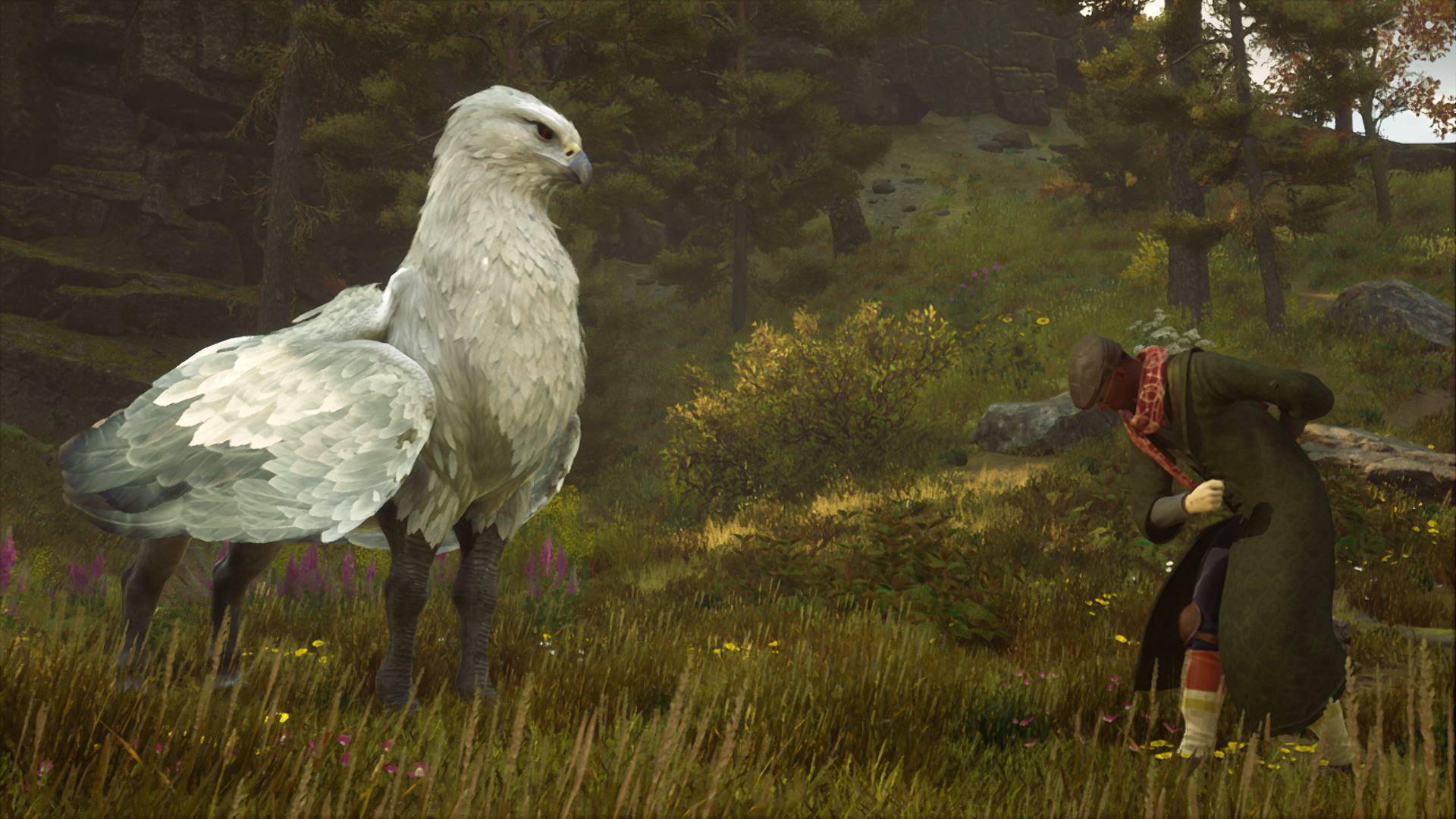
Tour of the wizarding world
For all those unexpected moments of discovery, Hogwarts Legacy is at its best when it puts you on a scripted path.
The development team at Avalanche has done a clever job of taking all the world of the Harry Potter books and weaving its plot and quests through as many familiar sites as it can. You’ll sneak into the basement of the Honeydukes sweet shop by taking the secret passage behind the one-eyed witch statue; steal your way into what will one day be Dumbledore’s office, past the sleeping portraits of previous headteachers; and even explore the house elf kitchen below the great hall, where the indentured servants load up tables of food to be magicked up to the waiting students above.
In those scripted quests, you don’t encounter the repetition of the open world. That’s when I most feel like I’m playing through a fresh adventure in the world of Harry Potter.
While you wind your way beneath the audience’s feet, two giant dragons are tearing each other apart in your peripheral vision
Some of the later missions, too, become huge setpieces. In one, you infiltrate a den of poachers in the Forbidden Forest. The dark wizards have captured dragons and are forcing them to fight each other in the magical equivalent of a cock fight. While you wind your way through the space beneath the audience’s feet, taking out poachers and goblins, two giant dragons are tearing each other apart in your peripheral vision.
The scripted missions often give you multiple methods to approach each encounter. While the choice comes down to sneak or fight (or, more often: sneak first, then fight), I enjoy casting disillusionment on myself to become invisible, and working my way through a goblin camp, getting up behind my enemies and tapping them on the shoulder with my wand, whispering ‘Petrificus Totalus’. The victim then snaps to attention, locked immobile like a board of wood.
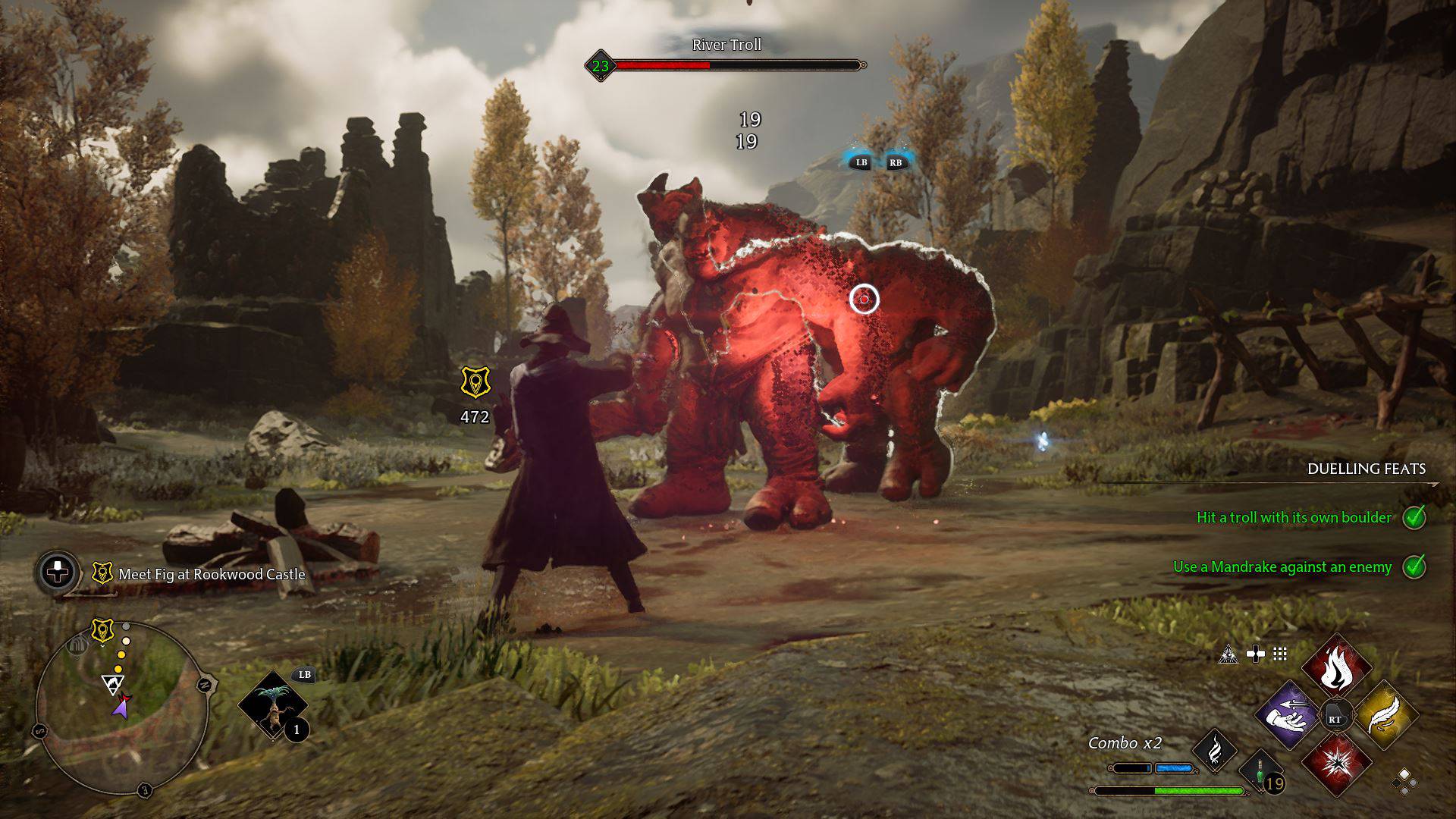
It’s deeply satisfying to hear the clang of an anvil hitting a troll in the face
When combat starts, you have a surprisingly deep toolset at your fingertips. Tapping the right trigger on your gamepad will send off a basic attack at your enemy, but holding the right trigger down lets, you cast more powerful spells that you’ve assigned to your face buttons. You can launch an enemy into the air with Levioso and then hit them with a string of basic spell attacks while they hang helplessly in the air. I’m a particular fan of using Accio to draw my enemies toward me and then hitting them with Incedio, the magic equivalent of a flamethrower.
You can also use the ancient magic your wizard wields to fling objects in the environment into your enemies. It’s deeply satisfying to hear the clang of an anvil hitting a troll in the face. You charge up your reserve of this special power by using your normal attacks and dodging or deflecting incoming assaults from your enemies. If you charge up enough, you can tap both shoulder buttons together to unleash an execution attack on your enemies.
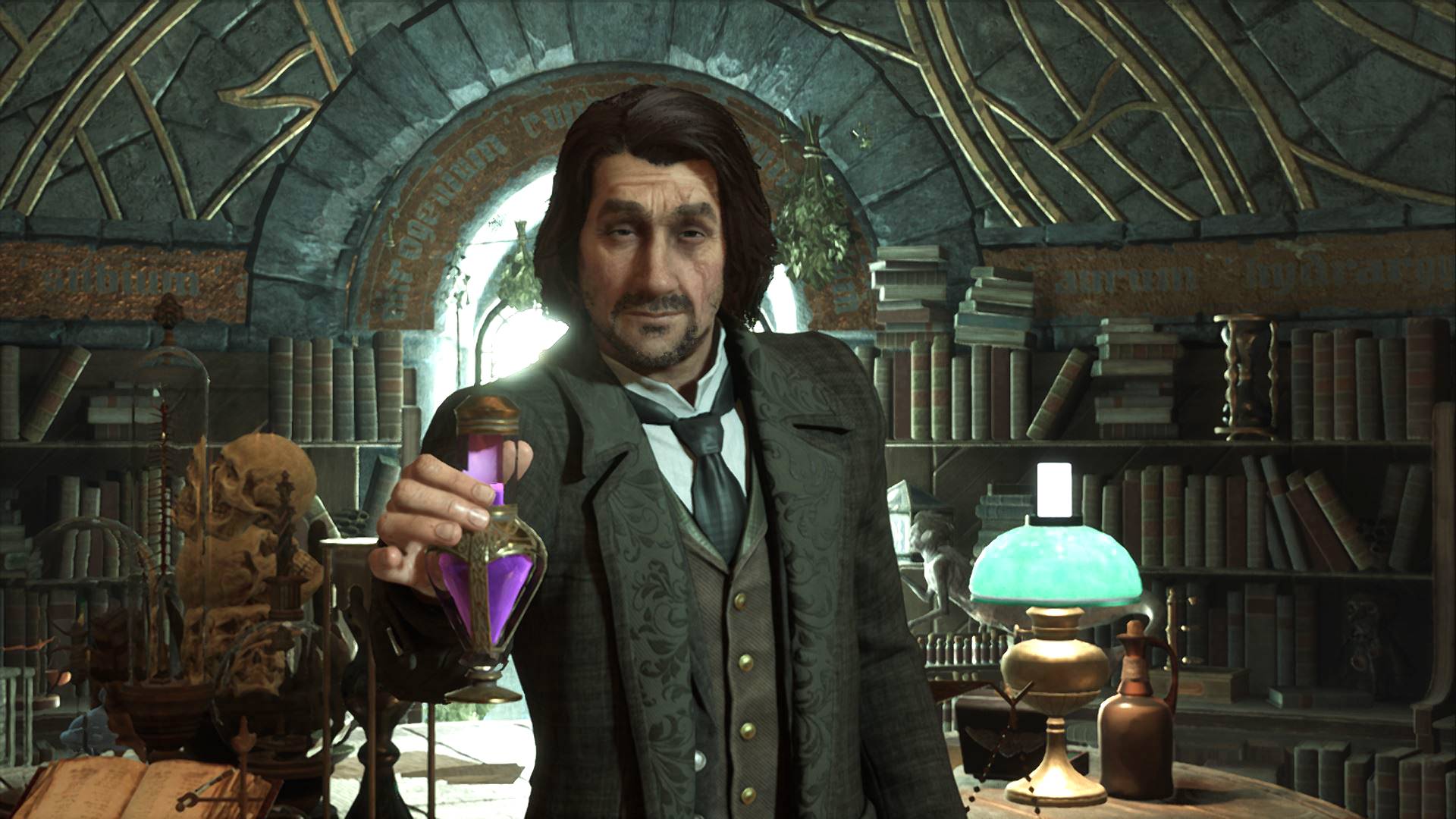
A talented wizard
As you progress through Hogwarts Legacy’s story, you unlock a talent tree where you can spend points you earn when leveling up to buff your spells and abilities. An upgraded Accio doesn’t just summon the enemy you’re targeting; it draws in all the enemies standing near them. Incendio becomes more than a flamethrower; it sends out a wave of fire in all directions, letting you hit people standing to the sides and behind you.
The talent tree also lets you unlock new spell wheels. As you can only assign four spells to the face buttons on your gamepad, this lets you have another set of spells ready to go at a moment’s notice. Hold the right trigger and press a direction on the D-pad to access this different set of spells.
After 18 hours with Hogwarts Legacy, I still find that swapping between spell wheels mid-combat is too much for me
When I first played Hogwarts Legacy, I found the combat too demanding for my clumsy fingers. I would try and swap between spell wheels in combat and become confused, never finding the type of spell I needed at the moment I needed it. That’s particularly the case when you need to match the color of the spell you’re using to break through the color of the shield your enemy is using. You can use Accio to break a purple shield, but it has no effect on a yellow shield; for that, you need a spell like Levioso.
After 18 hours with Hogwarts Legacy, I still find that swapping between spell wheels mid-combat is too much for me. Instead, I stick to the same four combat spells in every battle because I have it set up that no matter what kind of shield I’m facing, I have the necessary spell types ready to go.
I still use the spell wheels but have them set up by tasks. So, up on the D-pad brings up all my combat spells, and right on the D-pad are all my utility spells.
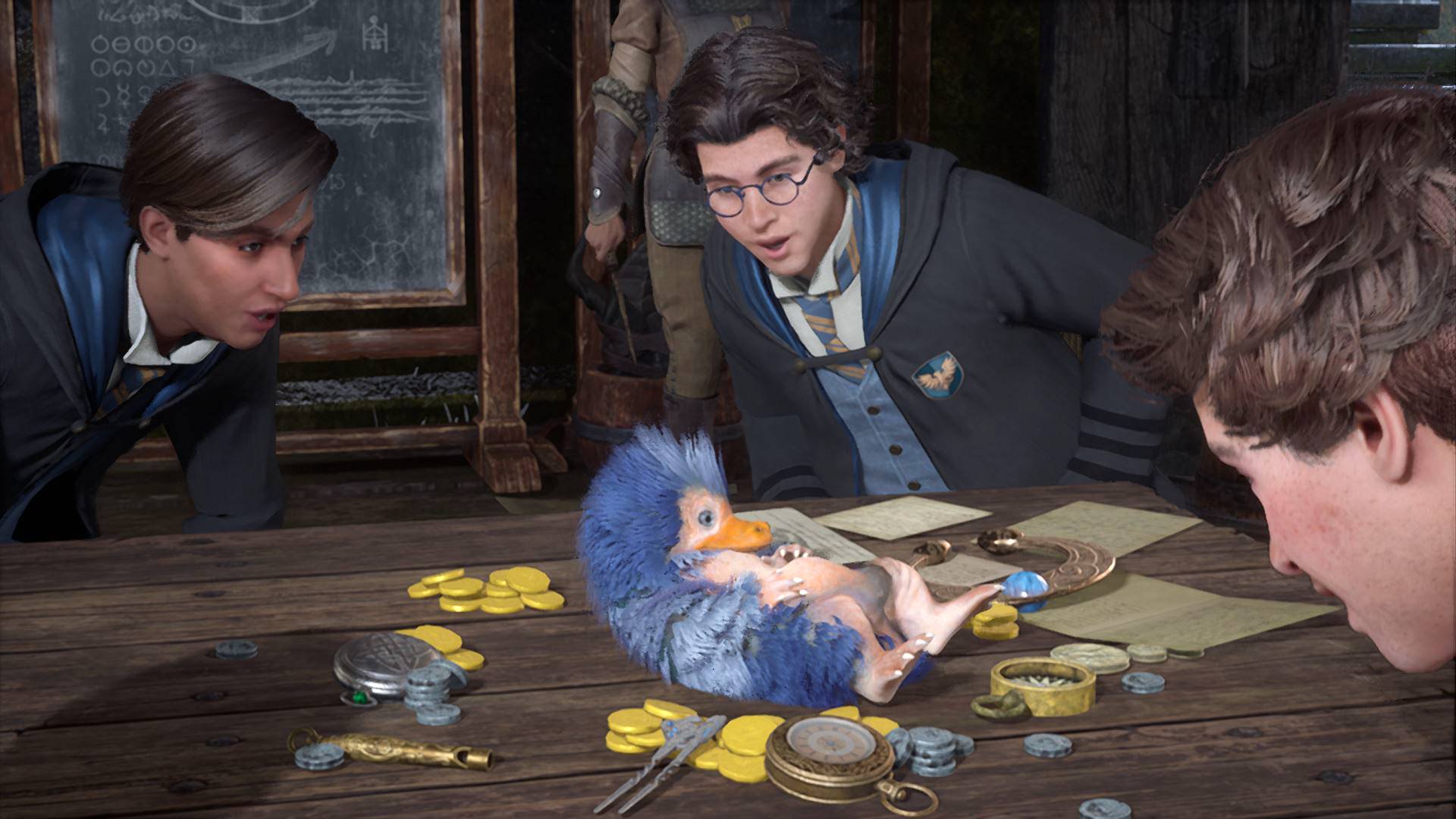
Stuffed pockets
Hogwarts Legacy has a lot going on. It has a scripted story that is full of set pieces that take you on a tour of the vaults of Harry Potter lore; it has a rich combat system that lets you toss and singe your enemies with combinations of spells; it has an open world filled with collectibles and looping interactions; and there’s more besides.
There’s the talent system, which you unlock midway through the game. There’s the room of requirement, which you can customize and fill with equipment to grow plants and brew potions. You can capture beasts in the Forbidden Forest and keep them in your own private sanctuary, where you can feed them, groom them, and take resources from them. A magical loom lets you upgrade your gear and fit it with new traits, like increased fire damage or defense against spider venom. You can fly around Hogwarts on a broom or a hippogryph, exploring the world or popping balloons for your flying teacher.
While a goblin rebellion threatens the world, I have to grow a mandrake for my herbology teacher
Hogwarts Legacy is a game that you can sink into. Sometimes I found that to be rewarding; other times, it was exasperating. Why, when a goblin rebellion threatens the wizarding world, am I being told I have to grow a mandrake for my herbology teacher? It is both the best Harry Potter game I’ve played and one which I often wished was leaner and more directed. I would play for hours and walk away feeling unsatisfied because I spent so much of that time running around looking for collectibles or completing small assignments for teachers rather than taking on the grand threat set up in the game’s opening hour.
It can be magical to walk the corridors of Hogwarts Legacy, but once you see through the illusion, it can feel empty.
from TechRadar - All the latest technology news https://ift.tt/dwY1svr

No comments:
Post a Comment